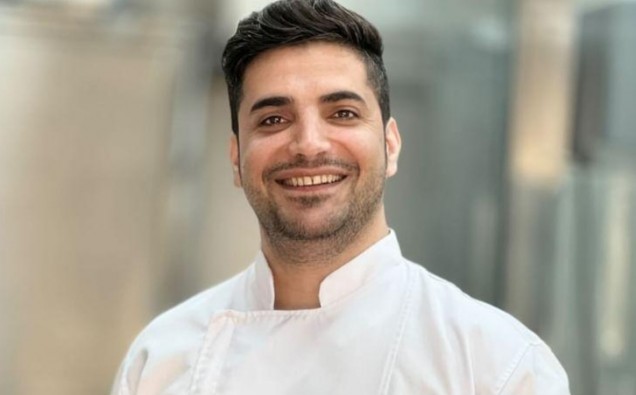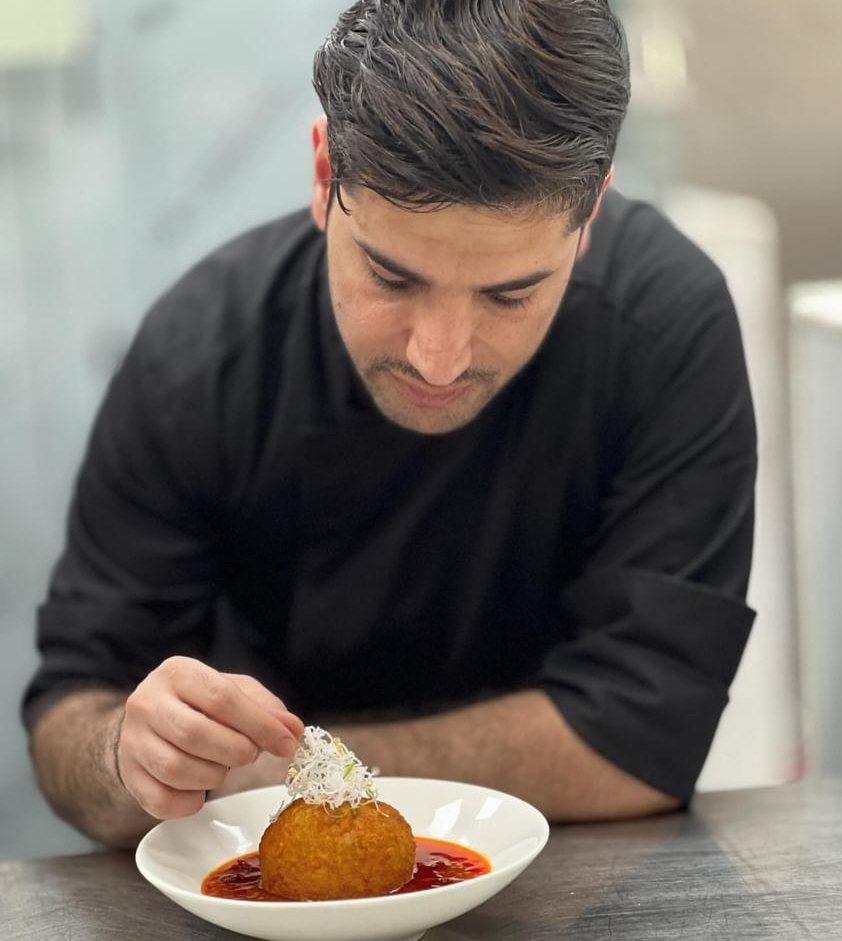Born in Iran, Chef Mostafa Haydari Rad (Instagram A/c: mostafa_haydarirad) began his career as a trainee chef and is currently a brand chef at the Chooleh Kabab Restaurant in Qatar. When he was younger, he used to enjoy seeing his mother make his lunch and dinner. He was always amazed at how she could create such delicious meals with just basic, flavorful ingredients. He then developed a passion for cooking and became interested in becoming a chef. He enjoyed experimenting with different flavors to add to old dishes in order to create new ones. Being a chef was always his ultimate goal, and he uses innovation in his cooking to convey the distinct culinary experience he has acquired so far. However, he had to overcome numerous obstacles in the beginning of his profession, so it was not an easy journey. At the age of 19, he made the decision to leave his hometown and family in order to pursue his goal. Without anyone’s help, he simply strolled into Tehran, the Iran’s capital, to launch his career. His employment search proved to be challenging, so he ended up working night shifts and moving restaurants. He began to study and refine his culinary skills in a variety of cuisines, including Arabic and Italian, as well as in the preparation and presentation of new dishes. Following years of culinary training, he was motivated to further his career by the satisfaction he had from sharing food with people and cheering them up with it at a table.
Q.) How crucial is it, in your opinion, to comprehend the cuisine in order to appreciate the food?
Chef Mostafa: I have to admit that food serves as a bridge between people from various cultures and origins. It influences how we feel and live. It is a part of our culture and a means of fostering connections with friends, family, and society at large. It’s important for us to realize that, regardless of one’s religious background, food has always served as a unifying force among people.
Q.) Why is Iranian cuisine sometimes referred to as Persian cuisine?
Chef Mostafa: Iranian cuisine has occasionally been referred to as Persian because the name “Persian” has historically been used to refer to Iran in the west. Prior to 1934, Iran was referred to as Persia. It is thought that the ancient Persian culture began in central Asia around 2000 B.C.
Q.) In what way would you characterize your cooking style?
Chef Mostafa: Throughout my career as a chef, I have been asking myself this question: all chefs identify as being from Italian, Asian, Persian, or another cuisine. I’ve always made an effort to go above such restrictions. Working at several restaurants in Iran has exposed me to a wide variety of culinary styles, including Arabic, Italian, and traditional Persian food. My cooking style, however, can be best described as “cook for the moment,” depending on what’s in season. In my cuisine, the seasons are the most significant factors.
Q.) Which Persian flavor combo is your favorite?
Chef Mostafa: I enjoy eating a wide variety of meals, and I adore my food. My preferred taste combination, though, is sour and spicy. Examples of this include the northern Iranian pomegranate juice and molasses-based Nardoon stew and the fiery rice dish Shirazi Kalam pilaf, which is paired with lamb and consists of sardine, aromatic herbs, and pepper.
Q.) Iran is a historic nation with a distinctive culinary culture. Does the cuisine change with the passage of time?
Chef Mostafa: As you mentioned, Iran Cuisine has a unique culinary tradition. Iran is home to numerous ethnic groups, including the Fars, Kurds, Turks, and many more. As a result, there are many different types of traditional cuisine, both savory and sweet. Absolutely, I have to agree food evolves throughout time. With increased travel and media these days, Iranian food has incorporated new spices and flavors. We have acquired new tastes over time, but we have also lost some of our own. I believe that this is a result of discovering food from different nations.
Q.) When it comes to Iranian food, what fascinates you so much?
Chef Mostafa: As I previously stated, the various ethnic groups in Iran have contributed to the country’s unique culinary culture. Persian food still has its ancient roots, even though it has undergone thousands of changes, similar to that of a few other nations. Iranian food is an unique feast of flavors and textures due to the fragrant blend of herbs, spices, fruits, and dried fruits. The use of fragrant herbs in our food has perhaps captivated me the most.
Q.) Different parts of Iran prepare their meals with a unique blend of spices. Would you kindly elaborate on it?
Chef Mostafa: More than 2500 different types of traditional food can be found in Iran; certain regions of the country have identical meals, but they use different components. Yes, to add flavor to meals, specific spices are used throughout Iran. Eg. In Southern Iran, alles pais, a unique spice, is used in a meal.
Q.) Any suggestions for the aspiring chefs?
Chef Mostafa: Being a chef requires a lot of effort; learning the fundamentals will take time and all of your energy. Cooking is like an art, so you should actually enjoy it. It is important that you approach your work with enthusiasm and discipline. Make an effort to learn as much as you can from those who have the ability to inspire you. Keep in mind that others will evaluate and analyze your food. Continue to study and have an open mind. Put your imagination to use and make some delectable food.
Most importantly, always respect the food and the people you work with.
By: Rida Khan (Aviation Author)
Instagram A/c: aviationauthor.ridakhan




















